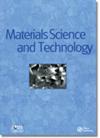Hardness and tensile strength of carbon nanoparticle-lithium borate composites
IF 2.2
4区 材料科学
Q3 MATERIALS SCIENCE, MULTIDISCIPLINARY
引用次数: 0
Abstract
Carbon nanoparticle (CNP)-lithium borate glass composites are synthesised by melt-quenching technique to study the influence of CNPs addition on the mechanical properties of the primary glass. Three different glass composites are fabricated by varying the weight% of CNPs. The hardness and tensile strength are found to increase by 2.65 times the primary glass with the addition of 0.4 weight% of CNPs. The homogeneous dispersion and close-packing of nanoparticles achieved in the resultant glass matrix account for this improvement. The closed-packed structure reduces the free volume between molecules, thereby limiting their movement and enhancing interfacial bonding. The formation of such a cross-linked structure with the addition of CNPs is supported by density measurements, electron microscopy images, and glass transition temperature studies.纳米碳-硼酸锂复合材料的硬度和抗拉强度
采用熔融淬火技术合成纳米碳-硼酸锂玻璃复合材料,研究纳米碳对原玻璃力学性能的影响。通过改变CNPs的重量%,制备了三种不同的玻璃复合材料。当CNPs的质量分数为0.4 %时,玻璃的硬度和抗拉强度是原玻璃的2.65倍。纳米颗粒在玻璃基体中的均匀分散和紧密堆积是这种改进的原因。封闭填充结构减少了分子之间的自由体积,从而限制了它们的运动并增强了界面键合。通过密度测量、电子显微镜图像和玻璃化转变温度的研究,支持了CNPs的加入形成这种交联结构。
本文章由计算机程序翻译,如有差异,请以英文原文为准。
求助全文
约1分钟内获得全文
求助全文
来源期刊

Materials Science and Technology
工程技术-材料科学:综合
CiteScore
2.70
自引率
5.60%
发文量
0
审稿时长
3 months
期刊介绍:
《Materials Science and Technology》(MST) is an international forum for the publication of refereed contributions covering fundamental and technological aspects of materials science and engineering.
 求助内容:
求助内容: 应助结果提醒方式:
应助结果提醒方式:


